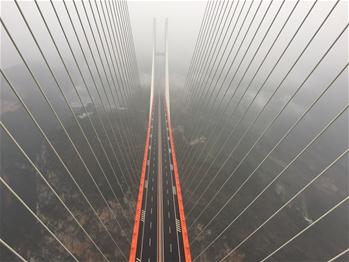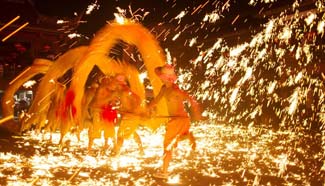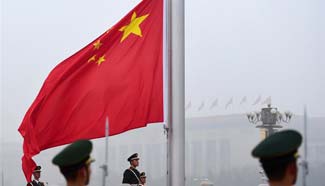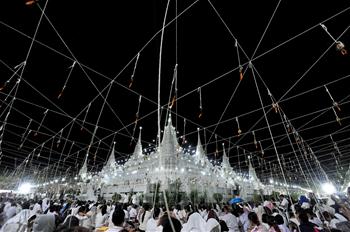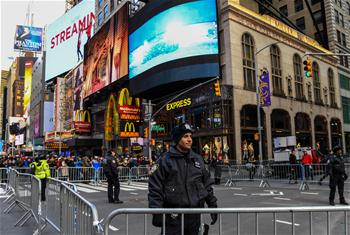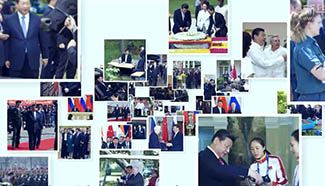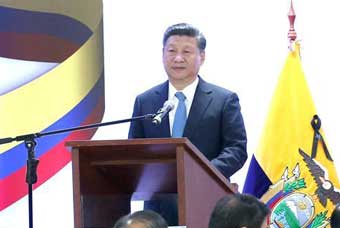by Hummam Sheikh Ali
DAMASCUS, Jan. 1 (Xinhua) -- One of the meanings of "Damascus" in the ancient languages is the "watered city," but the current crunching war is depriving this city of one of its main characteristics.
It may have never occurred to the people of this water-rich city that one day they would be deprived of the thing their city is famous of, as the location of the capital Damascus is strategic with a rich spring pumping almost 1,000 liters of drinking water per second, a water that is said to taste better than any other drinking water in the world.
The recent heavy rain and the pools of water it left on the streets have only left the capital people in pain over the waste of such waters while their taps are dry.
Still, such a predicament seemed inevitable given the fact that the nearly six-year-old conflict in the country spared no aspect of life untouched.
The capital has been cut off of water since Dec. 22, when the rebels severed the water pumping into the capital to pressure the Syrian government forces into succumbing to their demands in ending the battles on Wadi Barada, where the Ain-el-Fijah spring feeding Damascus with water is located.
Both conflicting parties traded barbs over the water outage, with the government blaming the rebels of contaminating the water with diesel, while the rebels blamed the government shelling of rendering the spring of Ain-el-Fijah out of service.
The government has resorted to its reserve wells to secure parts of the capital needs of water.
Harsh reality remains that the spring and its pipes are out of service, and the Damascenes are robbed of water.
Nader Rushdy, a 60-year-old retired engineer living in the Mazzeh neighborhood west of Damascus, now spends his time in the kitchen walking back and forth while his eyes fixed on the opened tap, longing to see the first drop of water to start filling his empty canisters.
"The water comes an hour every four days, I need to be prepared because I can't afford to miss that moment," he said.
When the water comes, he knocks on his neighbor's door so that both of them can help each other in filling their canisters in their roof-top tankers.
"The water I can save in this hour is only sufficient for drinking, I think we have to skip bathing these days," he said.
The situation in Mazzeh is slightly better than other less fortunate areas, as the water comes for an hour every four days, but in other areas, the water doesn't exist.
Scenes of people holding their jerry cans and water bottles queuing near public parks to fill their containers with water have mushroomed across the city.
Ayman Muhammad, a cardiologist, is now seen wearing his slippers and tracksuits, more than his scrubs.
Muhammad and his four little children are spending a considerable chunk of their time waiting in line to fill up their cans.
"We have suffered from long hours of electricity outages, the frequent scarcity in cooking gas, but we have never felt the pinch that we have felt with this terrible situation of water," he said.
To allay the people's apprehension, the government opened centers for selling bottled water at the official price rate, to prevent the possible monopoly by the traders.
The government also identified sources of waters in the capital for people to fill their containers for free.
Still, the authority's efforts are all but enough to indemnify the over five million inhabitants in Damascus as the end of this problem is nowhere insight.
The Syrian army has heavily shelled the rebel positions in Wadi Barada over the past few days, according to activists, as the rebels inside are with the al-Qaida-linked Nusra Front, which is excluded from a cease-fire that has been in place in Syria since midnight Friday.
On Sunday, state news agency SANA said that hundreds of civilians fled Wadi Barada, "fleeing the crimes of the terrorist groups."
The United Nations said in a statement Thursday that it was alarmed that four million inhabitants in Damascus and surrounding areas have been cut off from the main water supply since Dec. 22.
"People around Damascus have been without access to water in their homes for more than a week and are having to purchase water from private vendors, where prices and water quality are unregulated," it said.
UN said it was concerned about the lack of water which could lead to waterborne diseases, particularly among children, as well as the financial strain on families.
It said that throughout Syria, close to 15 million people are in need of water assistance, adding that households spend up to 25 percent of their income to meet their daily water needs.
It called on all parties to "reach peaceful agreements to alleviate the suffering of civilians, and that basic services, essential for survival, such as water supply, must be safeguarded and protected at all times."

